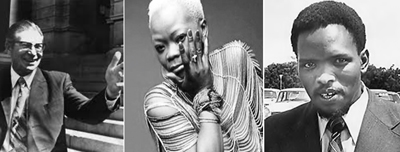Latest News Archive
Please select Category, Year, and then Month to display items
21 November 2024
|
Story Jacky Tshokwe
|
Photo Supplied
 Prof Mogomme Masoga, Dean: Faculty of the Humanities.
Prof Mogomme Masoga, Dean: Faculty of the Humanities.
On 8 November 2024, the South African Humanities Deans Association (SAHUDA) elected Prof Mogomme Masoga, Dean of the Faculty of The Humanities at the University of the Free State (UFS), as its new President. This appointment marks a pivotal moment for SAHUDA, which represents a diverse network of deans who champion the prominence and future of humanities, social sciences, and the arts in South Africa and beyond. Prof Masoga, who has served as Vice-President of SAHUDA for the past year, brings a wealth of experience and a deep commitment to advocating for the role of humanities in addressing the challenges of our contemporary world.
As President, Prof Masoga envisions broadening the influence of what he terms ‘public and applied humanities.’ His aim is to advance a humanities framework that not only enriches academic discourse, but also engages with critical global and local issues. This approach, rooted in socially responsive scholarship, will prioritise areas such as computational and digital humanities, environmental humanities, and other interdisciplinary fields that intersect with the pressing concerns of our time.
“The humanities are more relevant than ever to understanding complex societal issues,” Prof Masoga explained. “Through public and applied humanities, we can bring the critical perspectives of our field into active dialogue with the challenges of a digital and ecologically threatened world.”
His election underscores the University of the Free State's growing influence in national and international conversations about the future of the humanities. For the UFS, this leadership role enhances its reputation as an institution deeply invested in fostering meaningful contributions to society. Prof Masoga’s presidency is set to amplify the university’s voice and perspectives in SAHUDA’s mission to fortify the role of humanities in education and public life.
Over the next two years, Prof Masoga’s tenure will include a focus on initiatives that strengthen the relevance of humanities scholarship, encourage interdisciplinary research, and cultivate public engagement. He will also prioritise fostering collaboration across higher education institutions in South Africa and internationally to ensure that humanities disciplines are equipped to address the diverse needs of our rapidly evolving world.
Prof Masoga’s commitment to SAHUDA’s mission reflects the values and aspirations of the UFS Faculty of The Humanities. His presidency is an invaluable opportunity for the university to contribute to the national agenda of reinforcing the humanities as a field essential to a healthy, critically informed, and culturally aware society. This achievement serves as a proud moment for the UFS and a beacon for the potential of the humanities to drive societal progress in South Africa and beyond.
Understanding the nature of prominence
2014-03-14
|
 |
What did Hendrik Verwoerd and Steve Biko have in common? Or perhaps Johannes Kerkorrel and Brenda Fassie?
“They all possessed a certain natural predisposition to prominence,” says Prof Paul Fouche, reseacher in psychobiography at the University of the Free State’s Department of Psychology.
Prof Fouche and a team of researchers from other South African universities released findings on psychobiographical studies done on personalities that played a great role in our history.
The studies show that notable historical figures were very often prolific readers with a passion for literature since childhood. Generally, they also had a great love for nature and a sense of the sacredness of it, as well as a love for the cosmos.
The study further reveals that many of them were forced to take up leadership roles in the family from a very young age and were driven to succeed in order to take care of their own.
In many of these cases, there was a strong partner who supported the leader while they went about the business of governing their world.
Psychobiography is the systematic and descriptively-rich case study of renowned, enigmatic or even contentious individuals in socio-historical contexts within a psychological frame of reference. Over the past decade, psychobiography has become an established research genre and a methodology used by various academics and scholars in the field of life history research.